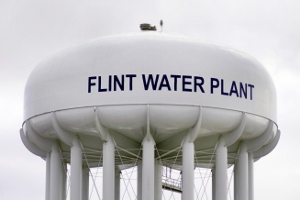Throughout the last couple months, news and commentary regarding the water crisis in Flint, Michigan has permeated the media. MLive literally has a “Flint Water Crisis” sidebar, celebrity tweets abound, and the topic has predictably wheedled its way into presidential debates on both sides of the aisle. Indeed, it seems like the last couple months have passed by in a lead-induced haze of questioning, finger-pointing, protesting, and shock as government officials at every level take a step back to ask themselves how, exactly, we got to this point.
Flint is not the only city in America with ageing infrastructure; in fact, the CDC estimates that today at least 4 million households have children in them being exposed to lead, whether through water, paint, or soil. The difference is that, in Michigan, the outdated pipes are matched by an outdated way of governance that ties the hands of local governments and renders them less capable to provide the basic, quality services that my generation expects from the places in which we live.
Leaving Michigan’s Cities Behind
Situations like Flint’s water crisis occur when state leadership expects local governments to create something from nothing. Local officials are tasked with providing quality libraries, public buildings, police and fire services, parks, and city utilities, but they’re expected to do so in an era of financial crisis brought on (in part) by years and years worth of disinvestment in Michigan cities. For far too long, Lansing has accused Michigan localities facing operational deficits of mismanaging their finances. Yet simultaneously, they’ve robbed those cities of vital resources through a steady decline in state revenue sharing.
Governor Snyder’s most recent budget proposal for the upcoming fiscal year provides funds that ameliorate the devastating effects of the Flint water crisis. However, the budget includes no restoration in funding to statutory revenue sharing, an increase of which would allow some cities to overcome deficits, invest in better infrastructure, and even finance placemaking efforts. Consider: had Flint not been deprived of more than $54 million between 2003-2014, the city may have dodged the water crisis altogether.
Now, Michigan lawmakers are proposing solutions to mend Flint’s decaying infrastructure and facilitate the long-term health of the city’s residents. They would be wise to realize that if they neglect to proactively address the policy failures that brought on Flint’s crisis in the first place, a disaster of similar proportions could occur all over again in an equally vulnerable Michigan community.
One Step Forward, Three Steps Back
The irony that Michigan, the Great Lakes State, a state that has focused a wealth of time and resources rebranding itself as “Pure Michigan,” has provided lead-tainted water to Flint’s citizens isn’t lost on anyone, millennials in particular. At a time when millennial retention is so crucial to Michigan’s redevelopment, the situation in Flint sends up a huge red flag to members of my generation. Frankly, we wonder – which of Michigan’s cities will be the next Flint? Do we really want to gamble with our health and well-being by choosing to settle in Michigan?
In the past few years, Michigan has made meaningful strides marketing itself to recent grads looking for a place to call home. Although Michigan has a comparatively high population loss for educated adults aged 18 to 34, that rate has been decreasing yearly. Leaders concerned over the state’s “downward spiral” image finally started to breathe a little easier, confident in the fact that we’d seen the worst of it and that Michigan was on the rebound.

Rather, Michigan’s cities, townships, and villages, and the innovative communities that they foster, will ultimately be the differentiating factor in whether or not Michigan is able to market itself to members of my generation. We look for effective transit options, diverse populations, walkable streets, engaging nightlife, and sustainability in the places that we choose to settle. A team effort between committed businesses, thriving universities, engaged citizens, and local officials can provide these assets, and the state should empower them with the resources necessary to do so.
Going forward, the state’s ability to attract and retain millennials will directly correlate with its willingness to demonstrate commitment to its many communities. Bridging the disconnect between state and local priorities will allow cities to improve infrastructure, maximize local resources, venture into placemaking, and reinvent themselves as places in which my generation would be proud to live.
Because Flint is a reminder (albeit a tragic one), that if the basic infrastructure isn’t there, the place just can’t thrive.
